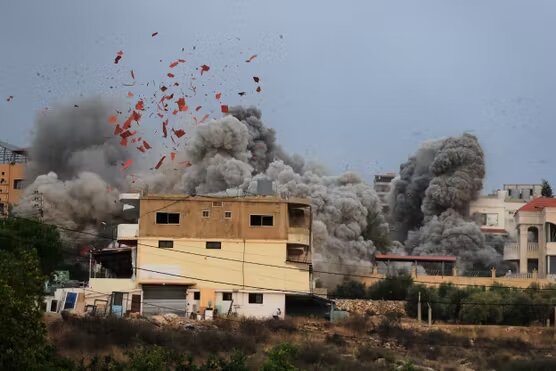Disarmament is a fig leaf for Israel’s campaign to dominate Lebanon

TEHRAN – Israel’s latest deadly airstrikes in southern Lebanon are not breaches of a ceasefire. They are the continuation of a war strategy dressed up as security enforcement.
Nearly a year after the truce with Hezbollah was signed, Israel has turned the ceasefire into a one-sided license to bomb, occupy, and intimidate. Thursday’s attacks that killed at least one person and injured multiple others, timed just hours after Hezbollah reaffirmed its right to resist, expose the reality: Israel is not reacting to threats — it is manufacturing them. Disarmament is not the goal. It is the excuse.
A ceasefire in name only
The Israeli military claimed Thursday’s strikes targeted Hezbollah military installations, accusing the group of refusing to disarm under the terms of the November 2024 agreement. But Hezbollah has consistently stated that it remains committed to the ceasefire — and will not disarm while Israel continues to violate Lebanese sovereignty with near-daily attacks.
President Joseph Aoun condemned Thursday’s strikes as a “full-fledged crime under international humanitarian law,” saying Israel’s actions criminalize the targeting and terrorizing of civilians. “Nearly a year has passed since the ceasefire took effect, and during that period Israel has spared no effort in showing its rejection of any negotiated settlement,” he added.
Israel’s strategy: Intimidation and control
Experts see Thursday’s strikes as a clear escalation — especially since they came just hours after Hezbollah released a public letter reaffirming its right to resist. Israeli warplanes also flew low over Beirut’s southern suburbs, a tactic widely viewed as psychological warfare.
UNIFIL, the UN peacekeeping force in Lebanon, warned that Israel’s strikes threaten civilians and undermine efforts by the Lebanese military to assert control over southern territory. While the U.S. continues to pressure Lebanon to disarm Hezbollah, it has done little to restrain Israel’s repeated violations of the ceasefire.
Hezbollah’s position: Defense, not capitulation
Hezbollah responded by rejecting any political negotiations with Israel, saying such talks would “not serve the national interest.” The group reaffirmed its right to defend Lebanon against an enemy that “imposes war and does not cease its attacks.”
Since the ceasefire took effect in November last year, Israel has maintained troops in five areas of southern Lebanon and carried out regular strikes. Hezbollah insists that Israel is exploiting the disarmament process to tighten its grip on Lebanese territory — and that resistance is not a choice, but a duty.
Unilateral violence
Israeli Prime Minister Benjamin Netanyahu — wanted by the International Criminal Court for war crimes in Gaza — warned a week ago that operations in Lebanon could intensify. Defense Minister Israel Katz echoed the threat, saying, “Maximum enforcement will continue and even intensify.”
This posture mirrors Israel’s behavior in Gaza, where a ceasefire with Hamas has not stopped daily attacks. Israel continues to decide unilaterally what constitutes a violation and responds with force, often against civilians.
Lebanon pushes back
President Aoun has signaled a shift. After Israeli forces crossed the border and killed a municipal worker in an overnight raid in late October, he ordered the Lebanese army to confront any further incursions. Though the army has largely stayed out of the conflict, Aoun — a former military commander — appears to have lost patience with Israel’s violations.
Under the ceasefire terms, Lebanon’s army is tasked with disarming Hezbollah in the south by the end of the year. But Hezbollah insists that Israel’s continued attacks and occupation make disarmament impossible — and dangerous.
Aggression by design
Israel’s actions in Lebanon are not about protecting its borders. They are about control, coercion, and keeping Lebanon weak. The demand to disarm Hezbollah is not a step toward peace — it is a tactic to remove the only force capable of resisting Israeli aggression.
Lebanon’s leadership is beginning to respond. But without international pressure on Israel, the violence will continue. The ceasefire, in practice, has become a one-sided arrangement — where Israel bombs at will, and the Lebanon government is expected to remain silent. Hezbollah’s stance, in this context, is not only justified — it is essential.
Leave a Comment